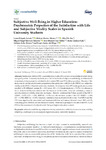Mostrar o rexistro simple do ítem
Subjective well-being in higher education: psychometric properties of the satisfaction with life and subjective vitality scales in spanish university students
| dc.contributor.author | Delgado-Lobete, Laura | |
| dc.contributor.author | Montes-Montes, Rebeca | |
| dc.contributor.author | Vila Paz, Alba | |
| dc.contributor.author | Talavera Valverde, Miguel Ángel | |
| dc.contributor.author | Cruz Valiño, José Manuel | |
| dc.contributor.author | Gándara-Gafo, Berta | |
| dc.contributor.author | Ávila Álvarez, Adriana I. | |
| dc.contributor.author | Santos-del-Riego, Sergio | |
| dc.date.accessioned | 2020-04-20T12:18:15Z | |
| dc.date.available | 2020-04-20T12:18:15Z | |
| dc.date.issued | 2020-03-11 | |
| dc.identifier.citation | Delgado-Lobete L, Montes-Montes R, Vila-Paz A, Talavera-Valverde MA, Cruz-Valiño JM, Gándara-Gafo B, et al. Subjective well-being in higher education: psychometric properties of the satisfaction with life and subjective vitality scales in spanish university students. Sustainability. 2020; 12(6): 2176 | es_ES |
| dc.identifier.issn | 2071-1050 | |
| dc.identifier.uri | http://hdl.handle.net/2183/25375 | |
| dc.description.abstract | [Abstract] Satisfaction with life (SWL) and subjective vitality (SV) are indicators of subjective well-being and quality of life. University students are at risk of low levels of subjective well-being, and therefore it is necessary to have properly validated tools to assess SWL and SV in this population. The aim of this study was to test the psychometric properties of the satisfaction with life scale (SWLS) and subjective vitality scale (SVS) in Spanish university students. Participants were 435 undergraduate students enrolled in 50 different courses (M = 20.9 years, SD = 2.1; female students = 71.2%). Confirmatory factor analysis (CFA) was used to test the structure of the scales. Internal consistency, criterion and discriminant validity were also evaluated. Results confirmed the 5-item model of the SWLS (NNFI = 0.975, CFI = 0.987, RMSEA = 0.076) and the six-item model of the SVS (NNFI = 0.980, CFI = 0.988, RMSEA = 0.102). Internal consistency was excellent in both scales. The SWLS and the SVS were significantly associated, and students with low self-esteem showed lower SWL and SV, indicating good criterion and discriminant validity. These findings support the use of the SWLS and SVS for the assessment of subjective well-being in higher education context. | es_ES |
| dc.language.iso | eng | es_ES |
| dc.publisher | MDPI | es_ES |
| dc.relation.uri | https://doi.org/10.3390/su12062176 | es_ES |
| dc.rights | Creative Commons Attribution 4.0 International License (CC-BY 4.0) | |
| dc.rights.uri | http://creativecommons.org/licenses/by/4.0/ | |
| dc.subject | Subjective well-being | es_ES |
| dc.subject | Subjective vitality | es_ES |
| dc.subject | Satisfaction with life | es_ES |
| dc.subject | Factor structure | es_ES |
| dc.subject | Validity | es_ES |
| dc.subject | Reliability | es_ES |
| dc.subject | Confirmatory factor analysis | es_ES |
| dc.subject | Higher education | es_ES |
| dc.subject | University students | es_ES |
| dc.title | Subjective well-being in higher education: psychometric properties of the satisfaction with life and subjective vitality scales in spanish university students | es_ES |
| dc.type | info:eu-repo/semantics/article | es_ES |
| dc.rights.access | info:eu-repo/semantics/openAccess | es_ES |
| UDC.journalTitle | Sustainability | es_ES |
| UDC.volume | 12 | es_ES |
| UDC.issue | 6 | es_ES |
| UDC.startPage | 2176 | es_ES |
Ficheiros no ítem
Este ítem aparece na(s) seguinte(s) colección(s)
-
GI-TALIONIS - Artigos [70]
-
UI-TOINF - Artigos [18]
-
UI-INTEGRA_SAUDE - Artigos [66]






